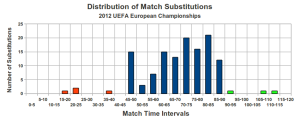Substitutions and their impact at Euro 2012
Categories: Player Performance, Team Performance
I continue my statistical review of UEFA Euro 2012 with a look at the substitution patterns over the duration of the tournament. The analysis is similar to what I did for the 2012 Africa Cup of Nations.
The following chart is the distribution of the substitution events at Euro 2012. Time segments are 5 minutes long for a total of 24 segments over the possible length of a soccer match. In contrast to my AFCON 2012 analysis, I did include stoppage time substitutions, of which there were ten – all in the second half.
There were 173 substitution events at the Euros (178 for the AFCON), which yields an average of 5.58 substitutions per game. Very few substitutions occur in the first half and are forced by injury. There is a big jump in the number of substitutions at the start of the second half as managers seek an immediate change in the game’s momentum (I haven’t looked at the scoreline at the half, but I would expect that most of those substitutions occurred when the team was behind). There aren’t two distinct waves in the substitutions, as was seen in the Africa Cup of Nations, but instead an increasing rate of substitutions that peaks between minutes 80 and 85. The rate of substitutions crashes during the extra time periods, most likely due to the lack of available subs on either side. Only three subs were made in extra time, and one in the first period of extra time, and two in the second period as teams made contingencies for the penalty kick shootout.
So which subs made the biggest impact? Here is a table of the 11 goals scored by substitutes in the competition, which displays the name, the time of entry, the time of the goal, and the scorelines (at the time of substitution, just before the goal was scored, and the final score). The scores are listed from the perspective of the substitute’s team. No substitute scored multiple goals in a match.
| Scorelines | |||||
| Substitute | Sub Time | Goal Time | Substitution | At Goal | Final |
| Dimitris Salpigidis | 46 | 51 | 0-1 | 0-1 | 1-1 |
| Roman Pavlyuchenko | 73 | 82 | 2-1 | 3-1 | 4-1 |
| Antonio Di Natale | 56 | 61 | 0-0 | 0-0 | 1-1 |
| Theofanis Gekas | 46 | 53 | 0-2 | 0-2 | 1-2 |
| Silvestre Varela | 84 | 87 | 2-2 | 2-2 | 3-2 |
| Cesc Fàbregas | 74 | 83 | 3-0 | 3-0 | 4-0 |
| Theo Walcott | 61 | 64 | 1-2 | 1-2 | 3-2 |
| Jesús Navas | 61 | 88 | 0-0 | 0-0 | 1-0 |
| Mario Balotelli | 74 | 90 | 1-0 | 1-0 | 2-0 |
| Fernando Torres | 75 | 84 | 2-0 | 2-0 | 4-0 |
| Juan Mata | 87 | 88 | 3-0 | 3-0 | 4-0 |
Of the substitutes who scored goals, two of them were halftime adjustments made by the manager (out of 15 substitutions at minute 46). Most of the goals scored took place in the last ten minutes of the match, as was the case in Africa. In contrast to the AFCON, the substitution payoff was quicker in the Euro — only two goal-scoring substitutes took longer than ten minutes to score (Balotelli and Navas). A slightly lower percentage of substitutes scored in the Euro than in the AFCON, but it didn’t take long for those substitutes to get on the scoresheet.
Of these 11 goals scored by substitutes, three goals placed their team in the lead, a position that resulted in two wins and a draw. Another three were scored in situations where the team was trailing, after which there was a win, a draw, and a loss. The other five substitute goals were scored while the team was in a winning position, and all of those teams went on to win the match.
When I work out the chart of result probabilities in my head, the results appear to correspond well with those ‘leverage’ curves that Chris Anderson has drawn up in the last couple of years. It would be interesting to explore that direction. The takeaway from this analysis is that the percentage of substitutes who score goals is small (~6%), and the percentage of goals that influence the result of matches is even smaller. There are lots of reasons that substitutes appear in matches, and some play roles that result in goals being scored even if they don’t score the goals themselves.
There’s a lot more to analyze here, and again, I’m just looking at match result data. I’m not examining match event data…at least not yet.


